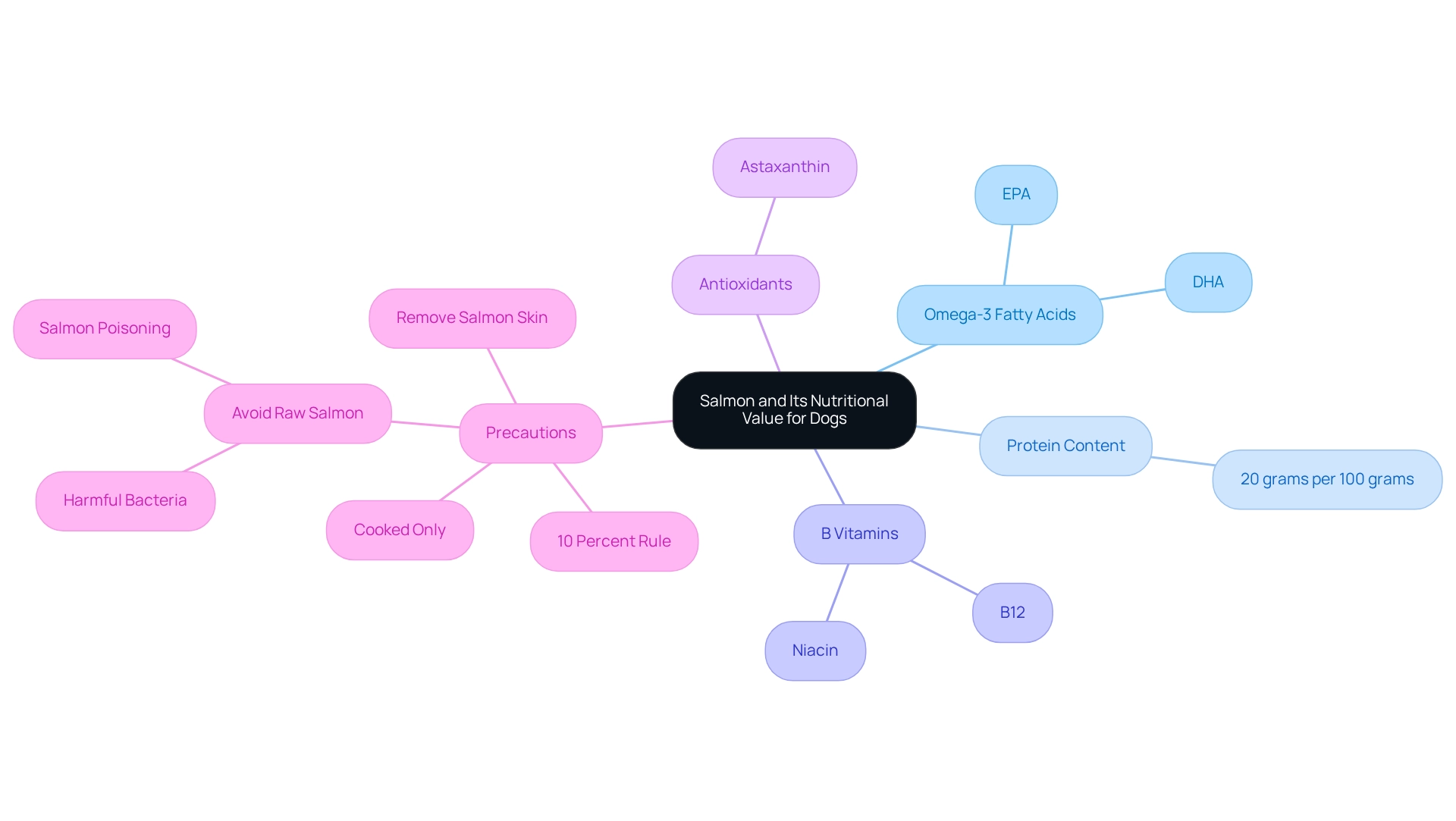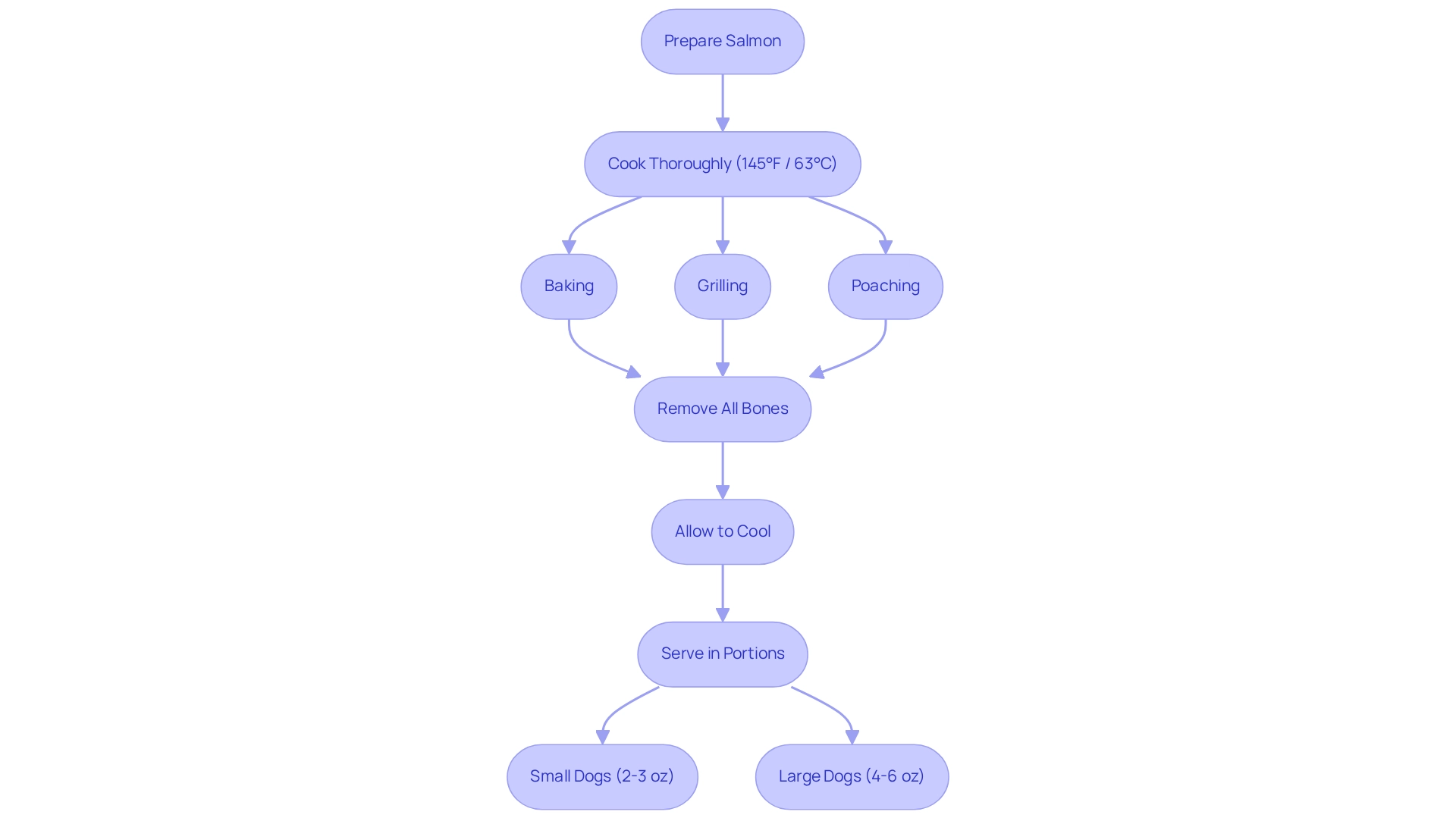Can Dogs Eat Salmon? Understanding Its Nutritional Value and Safety
Overview
As a loving pet owner, you may wonder about the best nutrition for your furry family members. Dogs can indeed enjoy salmon, which provides significant nutritional benefits. Rich in omega-3 fatty acids, protein, and essential vitamins, salmon promotes a healthy coat, skin, and immune system for your beloved companions.
However, it’s essential to prepare salmon with care. Cooking it thoroughly is crucial to avoid raw or undercooked fish, which can pose health risks associated with parasites and harmful bacteria. By ensuring proper preparation, you can nurture your pet’s health and well-being, creating a safe and loving environment for them to thrive.
Remember, your commitment to your dog’s health is a testament to the bond you share. Embrace the joy of providing nutritious meals, knowing that each bite contributes to their happiness and vitality.
Introduction
The discussion around what makes a healthy diet for our beloved dogs often leads caring pet owners to consider the benefits of adding fish, especially salmon, to their furry family members’ meals. Known for its impressive nutritional profile, salmon is rich in omega-3 fatty acids that not only help maintain a shiny coat and healthy skin but also bolster overall immune function. Yet, alongside these wonderful benefits, it’s crucial to keep in mind important safety and preparation considerations.
In this article, we will explore:
- The nutritional value of salmon
- The necessary precautions for safe consumption
- Practical tips for serving this delightful fish to your dogs
Our aim is to empower pet owners with the knowledge needed to make informed choices that enhance their pets’ health and happiness.
Define Salmon and Its Nutritional Value for Dogs
Your furry family members will love salmon, which raises the question, can dogs eat salmon? It’s renowned for its high levels of omega-3 fatty acids, particularly EPA and DHA, which are essential for your dog’s well-being, raising the question of can dogs eat salmon. These vital fatty acids contribute to a shiny coat, healthy skin, and robust immune function, ensuring your pet feels their best.
Imagine serving your dog a typical portion of fish, which provides about 20 grams of protein per 100 grams. This makes salmon an excellent protein source for canine diets, prompting the question, can dogs eat salmon to help them thrive. Additionally, salmon is abundant in B vitamins, including B12 and niacin, crucial for energy metabolism and neurological health.
But it doesn’t stop there! Antioxidants like astaxanthin not only enhance the nutritional profile of salmon but also support cellular well-being and help reduce inflammation. However, it’s important to serve fish cooked and in moderation, particularly when you ask, can dogs eat salmon? Ideally, no more than 10 percent of your dog’s daily caloric intake should come from seafood. This approach allows your canine companion to enjoy the benefits of this nutritious fish while minimizing potential health risks associated with raw or undercooked trout, such as poisoning from fluke worms and harmful bacteria.
As April Saylor wisely notes, “Raw seafood can harbor harmful bacteria and/or parasites that can lead to sickness in canines.” By thoughtfully incorporating fish into their meals, pet owners can consider the question of can dogs eat salmon as a tasty and nutritious treat. Remember, nurturing your pet’s health is a rewarding journey, and salmon can be a delightful part of that experience.

Assess the Safety of Salmon for Dogs
When wondering can dogs eat salmon, it’s important to know that salmon can be a nutritious addition to your furry family members’ diets, but it must be prepared properly to mitigate health risks. Thorough preparation is crucial to eliminate parasites, particularly Neorickettsia helminthoeca, which can lead to a serious poisoning disease. This condition can manifest through symptoms such as vomiting, diarrhea, and lethargy, and it can be fatal if not treated promptly. Therefore, it’s important to strictly avoid raw or undercooked fish.
As a caring pet owner, you should also consider the origin of the fish. Farmed fish often contains higher levels of toxins compared to wild-caught varieties, which can pose additional health risks. To ensure safety for your beloved pet, it’s advisable to select canned fish packed in water rather than oil. This choice is typically lower in sodium and more beneficial for canines. Rinsing canned fish can further reduce excess salt or oil, making it a suitable treat when prepared correctly. A case study has indicated that canned fish can be a great option for pets, provided it is prepared with care, reinforcing the recommendation to choose canned fish in water.
Veterinary specialists emphasize the importance of consulting with a veterinarian to determine if can dogs eat salmon before adding new foods to your dog’s diet, especially for pets with current medical conditions or dietary sensitivities. As Kate Basedow, LVT, notes, “Salmon also has vitamins A, D, and B-complex, as well as zinc, potassium, and magnesium.” By taking these precautions, you can safely include fish in your pets’ meals, providing them with beneficial nutrients while minimizing potential health risks.

Guide on Preparing and Serving Salmon to Dogs
To ensure the safety of your furry family members while preparing fish, it is essential to cook it thoroughly, reaching an internal temperature of at least 145°F (63°C). You can achieve this through baking, grilling, or poaching the fish, while being careful to avoid harmful seasonings like garlic or onions. Remember, removing all bones is crucial to prevent choking hazards. A straightforward method is to bake the fish at 350°F (177°C) for about 20 minutes. After cooking, allow the fish to cool before serving it to your beloved pet.
Salmon, a popular choice among pet owners, leads to the question of whether can dogs eat salmon, as it can be purchased fresh, frozen, or pre-cooked. It can be offered as an occasional treat or mixed into your dog’s regular food, leading to the question of whether can dogs eat salmon. Adjust portion sizes according to your dog’s size:
- Small dogs can enjoy 2-3 ounces
- Larger dogs can have 4-6 ounces of cooked fish per serving
As Dr. Sarah J. Wooten, DVM, CVJ, wisely notes, “To gain the advantages from fish, your dog doesn’t need a lot.” It’s important to monitor your dog for any adverse reactions when introducing new foods, as each pet may respond differently. Additionally, fish patties can be conveniently stored in the refrigerator for up to one week or frozen for two months, making meal preparation easier.
By following these recommendations, you can securely include fish in your canine’s meals, enhancing their nutritional intake while safeguarding their health. This approach aligns with the principles of preventive nutrition, emphasizing the importance of a nourishing diet in preventing obesity and diabetes in our beloved pets. Remember, your commitment to their well-being is a wonderful way to show love and care.

Explore the Health Benefits of Salmon for Dogs
Adding fish to your furry family member’s diet offers numerous advantages for their well-being. Rich in omega-3 fatty acids, particularly EPA and DHA, fish enhances skin condition and promotes a glossy coat. It also reduces inflammation and supports joint health, making it especially beneficial for senior dogs or those experiencing arthritis.
The high protein content in fish contributes to muscle development and maintenance, while essential vitamins and minerals bolster overall health, including heart and brain function. Regularly incorporating fish into your dog’s nutrition can also strengthen their immune system, helping them fend off diseases.
Moreover, the appealing flavor of fish makes it an excellent choice for selective eaters, encouraging them to enjoy a balanced diet. Notably, fish is easily digestible, making it suitable for dogs with sensitive stomachs. When prepared and served appropriately, the question of can dogs eat salmon becomes relevant, as it can be a valuable addition to your dog’s nutritional regimen, enhancing their quality of life.
As Kaitlyn Arford observes, with so many processed ingredients in some of today’s dog food, fish oil may be just the supplement to meet their dietary needs. At Adventure Den, we prioritize the health and well-being of every dog, ensuring they receive the best care and nutrition possible.
Key Benefits of Adding Fish to Your Dog’s Diet:
- Enhances skin condition and coat shine
- Reduces inflammation and supports joint health
- Aids muscle development and maintenance
- Bolsters heart and brain function
- Strengthens the immune system
- Appeals to selective eaters
- Easily digestible for sensitive stomachs
Isn’t it time to consider how fish can enrich your dog’s life? Let us help you provide the nurturing environment your beloved pet deserves.
Conclusion
Incorporating salmon into your furry family member’s diet can significantly enhance their health and well-being, thanks to its rich nutritional profile. With high levels of omega-3 fatty acids, protein, and essential vitamins, salmon supports a shiny coat, healthy skin, and robust immune function. It also contributes to joint health and muscle development, making it particularly beneficial for older dogs or those with specific health issues.
However, safety precautions are paramount when serving salmon to pets. Proper cooking is essential to eliminate harmful parasites and bacteria, and it’s crucial to be mindful of the source of the salmon. Choosing wild-caught over farmed salmon and opting for canned varieties packed in water can reduce the risk of exposure to toxins. Consulting with a veterinarian before introducing salmon into your dog’s diet is also advisable, especially for those with existing health concerns.
By following the recommended preparation guidelines and serving sizes, you can provide your dog with a delicious and nutritious treat. Regularly incorporating salmon into their meals not only promotes overall health but can also make mealtime more enjoyable for picky eaters. Ultimately, with the right approach, salmon can be a valuable addition to your dog’s diet, contributing to a happier and healthier life.
Frequently Asked Questions
Can dogs eat salmon?
Yes, dogs can eat salmon, which is rich in omega-3 fatty acids, particularly EPA and DHA, essential for their well-being.
What are the health benefits of salmon for dogs?
Salmon contributes to a shiny coat, healthy skin, robust immune function, provides protein, and is abundant in B vitamins, which are crucial for energy metabolism and neurological health.
How much salmon can I feed my dog?
It is recommended that no more than 10 percent of your dog’s daily caloric intake should come from seafood, including salmon.
Should salmon be cooked before feeding it to dogs?
Yes, salmon should be served cooked to minimize potential health risks associated with raw or undercooked fish, such as poisoning from fluke worms and harmful bacteria.
What additional nutrients does salmon provide for dogs?
Salmon contains antioxidants like astaxanthin, which supports cellular well-being and helps reduce inflammation.
What risks are associated with feeding dogs raw salmon?
Raw seafood can harbor harmful bacteria and parasites that can lead to sickness in canines, making it important to cook the fish before serving.







